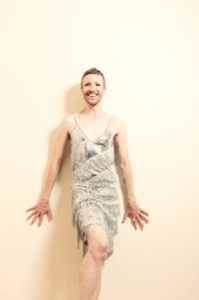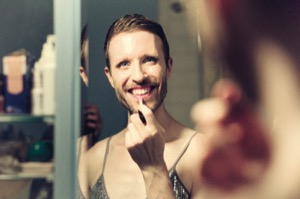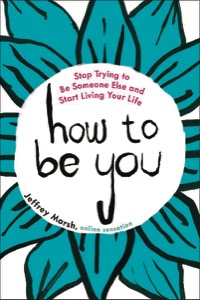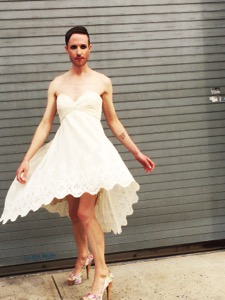
Meet the Vine star, author and youth advocate who has lit up social media with more than a quarter billion views
In an age of often vapid social media, where our likes, dislikes, beliefs and values are funneled through an echo chamber of our own choosing, it is no surprise that both the metrics and the parameters of fame have changed significantly. The movie star who rakes in millions is now on equal footing with the YouTube sensation who speeds up his voice to sound like an animated chipmunk. The actor who lost weight or braved the elements or went off for six months to learn what prison is really like is no longer in a class by him or herself as a torrent of new media and a global population willing to create content for that torrent approaches the gate.
Jeffrey Marsh, the genderqueer sensation who has taken Vine by storm, appears, luckily for the LGBTQ community, not to be just some momentary fluke with a sense of content-importance. Jeffrey’s positive affirmations – which can be largely crystallized down to ‘There is nothing wrong with you’ – have struck a chord in many of today’s youth who, despite enormous strides, continue to struggle with acceptance while navigating a still-hostile world.
Frequently on Vine, a social video app that conveys six-second messages in an endless loop, one can find Jeffrey dancing around in a dress, some blue eyeshadow and frequently a strain of cherry-red lipstick reaffirming everyone’s fabulousness. It seems rather hokey in a Mr.-Roger’s-Neighborhood sort of way but it has caught on like wildfire and there seems to be no corner of the Internet that Jeffrey has not grabbed onto with their message of love and acceptance.
We caught up with Jeffrey to find out who this Internet personality is and what gets them going.
San Diego LGBT Weekly: What do you tell people you do when they ask?

Jeffery Marsh: My all-time fave response is, “I’m really big on the Internet” because nowadays that’s a thing! If it’s a fancy context, I’ll say something like, “I have over a quarter of a billion views on social media and I’m an author with Penguin Random House”. Doesn’t that just sound fancy? I guess, just like ‘What’s your identity?’, the question ‘What do you do?’ is highly contextual!
Do you feel Vine is the medium that works best for your short, uplifting, six-second sound bites and or visuals? If so, why?
My message has always been ‘there is nothing wrong with you.’ Take a couple of breaths. Read that again. There. Is. Nothing. Wrong. With. You. Would you believe I have never met a single person online or off who wasn’t told in some way that there is something wrong with them? I work every day to undo some of that programming we’ve all received. Vine helps me with this mission in a few key ways. As you mention, it’s short. Each Vine is a 6.5 second (or less!) distillation of that core message. In a Vine, I directly address the viewer with a heartening message or I dance around or I tell a joke, but it is always by design something short, sweet and highly digestible. Another helpful thing about Vine is the humanity of it. I get messages all the time from folks who are not queer but see their personhood reflected in me. Video is a highly personal medium, and Vine makes it more personal by stripping it down to your iPhone, you, and your viewers. Vines also loop — over and over on repeat. This helps to reinforce the message.
How has social media affected the message of positive reinforcement? Do you ever feel that it gets drowned out by the sheer torrent of messages available today? If so, how does one do what you’re doing?
If I’ve learned one thing, it’s that people are utterly desperate for my messages. That’s not to brag, it’s just to point out that I never predicted that something loving and kind and affirming could go viral and have the widespread impact my videos have had. The people that need me always find me. And I know it’s essential never to censor the message. You’ll find Vines in my feed that get less likes than others. I don’t believe it’s my job to always try to get likes or do what’s popular or do what will help my Vines stick out in the “sheer torrent” you so aptly mention. It seems like being honest and authentic and me (for lack of a better way to say it) is enough. People who need to find me, find me. And maybe that authenticity makes my videos stand out from the torrent in a truly unique way. The bottom line is that I’ll never change the message. This is exactly why I wrote How To Be You.
We know who you are now. But who were you then? What qualifies you to stand above all the other Viners/social media presences in declaring yourself a bonafide ‘personality’?

Great question! I’m not sure I stand above anybody. Aren’t we all personalities? I guess you could say that not every social star is an author with a major publisher, and not every social star has been Buddhist for over 15 years and lived at a monastery. What I’m guessing “qualifies” me, if we want to talk about it in those terms, is that I speak the truth. I trust that people can recognize when someone is being honest and open with them. In other words, hopefully people can see the truth and quality in what I’m saying, and that simple truth is all the pedigree people should need.
In one Vine clip, you reach out to those followers who may have suicidal ideation. How are you qualified to help? Do you have formal training in, say, social work?
This is something I’ve given quite a lot of thought to. You’ll notice in my videos I talk in very general terms about “feeling suicidal.” This is why, on the whole, I point people who may be suffering in more specific ways toward larger organizations who I’ve collaborated with, like the Gay, Lesbian and Straight Education Network (GLSEN) and the Trevor Project. Every day, I get comments and messages saying “I was feeling suicidal, and I’ve decided to stick around because I saw your video”. People clearly have a ton of stigma around these thoughts and feelings. It seemed like an important topic for me to address. The only message I would want people to receive is that if they have considered suicide, they are not alone and there is help available if they need it. In How To Be You, I tell people ways to discover more about themselves (their lovely qualities and innocence) and then how to love and accept what they’ve discovered. I offer this because it’s a process I’ve been through. I consider my work a starting point for someone who may be struggling, and I talk in the book about further resources. I do not offer personal counseling or run a hotline precisely because I’m not qualified to do those things.
Explain ‘genderqueer.’
I try not to explain myself! To me, genderqueer is the closest label there is to no label at all. What does genderqueer signify? It’s a way to talk about my personal gender expression. I do not identify with terms like man and woman. That is a deep, evident truth for me. I am not a man or a woman. As you might have guessed, I’m not quite sure what I am, but I do know I don’t fit into the binary-restrictive view of gender. Hence! I use the term genderqueer to describe my own slippery morphic hard-to-pin-down identity.
“Jeffrey has had a successful public speaking business for years; at lectures and talks, Jeffrey distills the often complicated ideas of gender, identity and sexuality into clear accessible language.” Are these ideas born of academic study – say queer studies – or something more personal?

It is highly personal. When I am asked to speak it is always as myself, not as a researcher. I do cite recent research in my talks of course, but it is always in the context of what it is like to be me and therefore, more broadly, how to be you. The reason I can take complicated research and distill it down into accessible language is because it is my personal lived experience. To me it’s not academia, it’s my life. There’s nothing wrong with academic research of course, but what I offer by way of public speaking is an openness about how gender, sexuality and identity intersect in a “sample of 1.”
Who has influenced you in who and how you are today?
I admire anyone who is bold enough to be themselves, especially when parents or bosses or our modern American culture encourages them not to be. So in specific terms, it’s David Bowie and Laverne Cox, but also I must say that I am inspired by the young people I interact with online. I see such bravery and fortitude every day. The kid who risks being rejected by her family and school because she wants to take a same-sex date to the prom or the 16-year-old who asks everyone at church to use they/them pronouns for them. It blows my mind! Whatever inspiration people take from my work, I receive 10 times as much inspiration from the real honest lives of the integrity I am privileged to see being lived all over the world.
More at: http://www.jeffreymarsh.com/ and https://vine.co/jeffreymarsh











